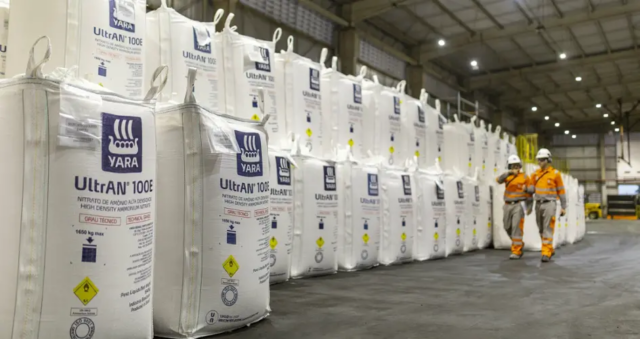Yara: biomethane-based fertiliser production in Brazil
By Geofrey Njovu on December 19, 2024
Low-carbon coffee beans

Click to learn more. Yara’s biomethane-based nitrate fertilisers have the potential to replace fossil sourced natural gas, leading to a lowering of the fertiliser carbon footprint of up to 75%. Source: Yara.
Yara has commenced the production of biomethane-based ammonia at its industrial complex in Cubatão, Brazil. The biomethane is sourced from sugarcane waste in place of fossil gas, reducing GHG emissions by up to 75%. Yara’s Cubatão complex, which is now equipped to operate with biomethane, is the largest natural gas consumer in São Paulo, and Brazil’s largest ammonia producer.
The first batch has already been delivered to coffee producers from Cooxupé, a cooperative headquartered in Guaxupé, Minas Gerais. The low carbon fertiliser will lead to an estimated 40% reduction in the coffee bean’s carbon footprint. The participating producers represent over 20,000 cooperative families of Cooxupé. The initiative is an important step in the decarbonisation of coffee bean production in Brazil.
The Cooxupé delivery was transported by truck from the Port of Santos to Alfenas, Minas Gerais. To further reduce the carbon footprint, the packaging used was made from recyclable plastic, another Yara initiative to promote sustainable storage and transportation.
This is a significant step in building renewable-based value chains across sectors and industries, from food and mining to on-and off-shore transport. For agribusiness the impact is huge. By integrating this new generation of lower carbon fertilizers into our agronomic expertise, we offer farmers greater value while unlocking new markets and revenue streams. In coffee farming alone, we anticipate a reduction of up to 40% in the carbon footprint of harvested beans.
Marcelo Altieri, Yara Brazil President, in his organisation’s official press release, 6 December 2024
The delivery of solutions towards climate neutrality is a global strategy for Yara and reinforces the potential of the fertilizer sector to contribute to a sustainable food future. Climate change is shaping the way we must produce food, and this new direction requires a coalition effort between producers, companies, and the industry. The partnership between Yara and Cooxupé is a milestone for Brazil and symbolizes this joint effort, which brings a significant positive impact to nature and society as a whole.
Marcelo Altieri, President of Yara Brazil, in his organisation’s official press release, 11 November 2024
Our cooperative is committed to coffee production based on sustainability, quality, and traceability. We export our coffee to 50 countries, and our strength comes from cooperativism and partnerships that bring innovation, technologies, and inputs to our members, enabling good agricultural practices within the farms, as well as food security for those who consume our coffee worldwide.
Carlos Augusto Rodrigues de Melo, Cooxupé President, in Yara’s official press release, 11 November 2024
Yara’s low-carbon fertiliser portfolio
The biomethane-based fertiliser is part of the Yara Climate Choice™ portfolio, the company’s brand of fertilisers produced from low-carbon technologies such as renewable electricity-powered hydrogen & ammonia, CCS-based ammonia.
In addition to its own production pipeline including Herøya Industrial Park and Sluiskil, Yara, in July this year, announced plans to offtake ATOME’s electrolytic ammonia-based calcium ammonium nitrate (CAN) fertilisers and market it as part of the Yara Climate Choice portfolio. The project, based in Villeta, Paraguay, will produce 246,000 tons of CAN per year from 2027.
On the demand side, also in July, Yara announced an agreement to supply 165,000 tons per year of a mix of Yara Climate Choice and standard nitrate fertilisers to PepsiCo in Europe, to be used initially for potato production. The low-carbon fertiliser proportion of the supply mix will increase (to 100% eventually) as Yara scales availability of its Climate Choice portfolio.